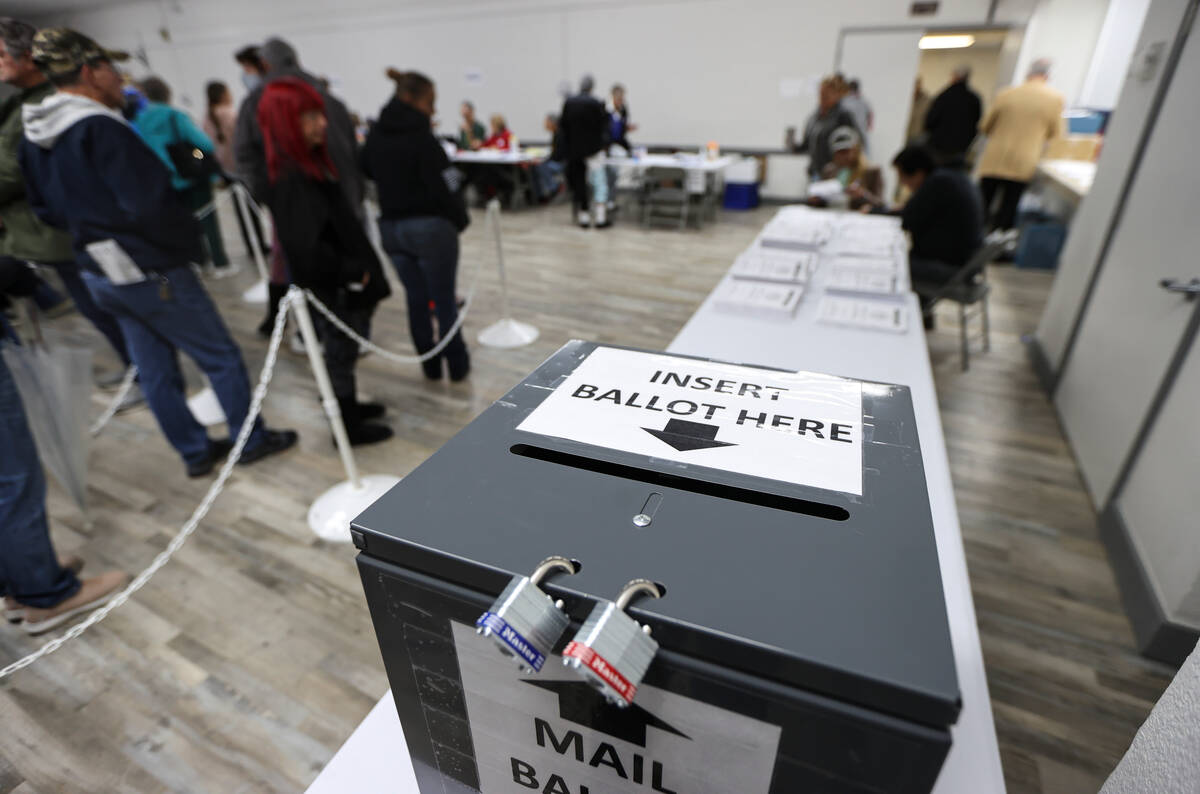Statewide ballot questions gaining voter support, early returns show
Voters were supporting all three statewide ballot questions, including one aimed at overhauling the partisan primary system in Nevada.
Ballot Question 3 would eliminate partisan primaries for Congress, the Nevada Legislature and statewide constitutional offices, allowing all voters, regardless of party affiliation, to vote in these primary contests. The top five vote-getters would advance to the general election, where voters would then select their preferred candidate and rank the remainder.
In returns as of Wednesday evening, 51.7 percent of voters had voted “yes” on Question 3, and 48.3 percent had cast “no” votes.
Shane Lewis said he voted against the measure because it “kind of turns it (voting) into a circus.”
“Either party could sabotage the other,” said Lewis, 49, who was voting Tuesday evening with his 90-year-old grandmother, Donna Lewis, at the Veterans Memorial Community Center in Summerlin.
But nonpartisan Renee Lee supported the measure, saying she has wanted to vote in partisan primaries for a long time. “I’m glad they’re making changes,” the 50-year-old said.
Meanwhile, Ballot Question 1’s equal rights amendment was winning by a wide margin. The question would amend the Nevada Constitution to add a specific guarantee of equality under the law regardless of race, color, creed, sex, sexual orientation, gender identity or expression, age disability, ancestry or national origin.
Early returns showed 57.4 percent of votes in favor of Question 1 and 42.6 percent in opposition.
The remaining statewide ballot question, Question 2, which would require a $12 minimum wage, also was gaining approval. The measure also would remove the existing provision allowing employers that provide health insurance to pay $1 less per hour.
Voters were approving Question 2 with 53.4 percent of votes in favor of it and 45.7 percent against.
Voters in Henderson were supporting a switch to ward-only voting for City Council members, rather than citywide voting: 67.5 of votes were in favor of the move and 32.5 percent were in opposition.
Question 3
Question 3, formally called the Better Voting Nevada Initiative, launched with an initiative petition filed by a political action committee called Nevada Voters First.
According to the PAC, the current partisan election process excludes more than one-third of all Nevada voters from casting ballots in primary elections and is controlled by the two major political parties.
Prominent conservative and progressive politicians and groups have panned the measure.
John Tsarpalas, president of the conservative Nevada Policy Research Institute, said the measure was confusing and disenfranchising, and could lead to one party meddling in the other’s primary.
Annette Magnus, executive director of Battle Born Progress, said the measure is backed by out-of-state billionaires who want to test their election theory in Nevada. “And I don’t want to be anybody’s guinea pig,” she said.
But Sondra Cosgrove, executive director of Vote Nevada, said changing the system would foster more moderate candidates and less divisiveness. Her group is part of a coalition supporting the measure.
To opponents, she said, “What is your solution. because our system seems to be failing a lot of people.”
If approved, the measure would come before voters again in 2024.
Question 1
Supporters of Question 1 say that it would close gaps in discrimination protection, including in unequal pay for women and in pregnancy discrimination.
Opponents say that it would be used by biological males and transgender athletes as a basis to undermine women’s sports by paving the way for them to compete unfairly against women and girls in school sports and for athletic scholarships.
Magnus said the opponents’ argument is a “scare tactic,” and both transphobic and homophobic.
“This is happening in Title 9 right now in sports for women,” Tsarpalas said. The wording of the measure is open to interpretation, including in regards to the rights of children over those of parents, he said.
“It’s too early to put this into a constitution,” he said. “It needs to get figured out, debated and perhaps voted on at legislative levels.”
Voter approval would be the final step in the process following a resolution approved by the Legislature in 2019 and again in 2021.
Question 2
Question 2 would replace existing existing constitutional language that sets a two-tiered minimum wage, which is $9.50 per hour if employers offer health benefits and $10.50 per hour if they do not. It would match Nevada’s minimum wage to the federal wage if it ever exceeds $12 per hour. The amendment would end tying incremental increases in the wage to inflation.
Proponents say the measure is needed to guarantee a wage of at least $12 per hour and to avoid penalizing workers who opt out of the employer’s health insurance program. Some employers are “offering garbage health care that their employees can’t afford,” Magnus said.
Tsarpalas said that setting a minimum wage has been shown to reduce jobs and hiring for workers with less training.
Fewer than 1 percent of workers in Nevada get paid at or below minimum wage, which is scheduled to increase to $12 an hour regardless in 2024 regardless of passage.
Voter approval of the ballot question would be the final step in the process.
Henderson question
Advocates for the Henderson ballot question say it would make council members more responsive to constituents, because they would be elected only by voters in their ward, allowing them to become experts on ward issues. They also argue it would increase the potential for minority groups to elect a member of their community.
Opponents say the measure would foster division, rather than cooperation, among council members, encouraging them to fight for resources for their particular ward. They contend it would also discourage council members from being accountable to all voters in the city.
Contact Mary Hynes at mhynes@reviewjournal.com or 702-383-0336. Follow @MaryHynes1 on Twitter.























